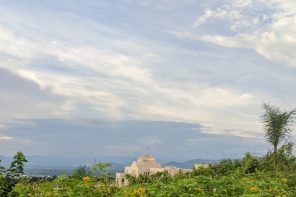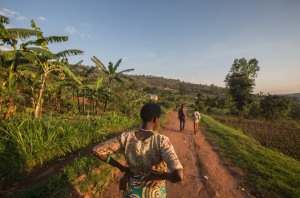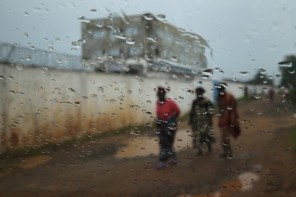This is the first of a two posts about this. Mostly because I wrote this, went to bed at 2 am, then I got up to another email from Nick Kristof. Thanks, Nick, for taking the time to talk with me about this. Readers might want to see Part II.
There was a bit of a furor over Nicholas Kristof’s 1/31 column in the New York Times. In the column, Kristof tells the story of a 9-year-old girl rape survivor. He uses her full name, and the article includes pictures and a video of the girl, her face unobstructed.
It caused a stir this week, largely because some readers objected to naming a 9-year-old girl. Why? Because in the States, we don’t name minors who are victims of crimes in general — and newspapers almost never name minors who are victims of sexual assault, even if they consent. There are guidelines that generally warn against publishing a minor sexual assault victim’s name. In matters like this, I personally turn to the Dart Center on Journalism and Trauma’s tips on covering children, but there’s also cautionary notes in the Society of Professional Journalists’ ethics statements (the part on minimizing harm). There are others.
Why I emailed Nick Kristof instead of taking straight to the blog
I’ve fired scathing blog posts right off before, about this very issue and aimed directly at other pieces of journalism; I regret that. I think I would have learned more — and maybe you readers would too — if I had been more measured and talked first to the journalist whose work I critiqued.
So I started where a journalist should: investigating my assumptions. I called a Times publicist to find out whether Kristof used the girl’s real name, or whether we were all in a tizzy about an unacknowledged pseudonym.
Nope. Real name, I’m told.
Then I sent an email, through the publicist, to Kristof, asking him to respond to some of the criticisms. I think it’s worth drawing attention to one issue he picked upon: What does “informed consent” to use one’s image and/or story on the Internet mean in places where there is no Internet? Or, as I put it in my email to Kristof, “Can you detail for me the balance you felt you struck — what you gained by naming her and using her image, and why that outweighs the costs of some recommendations on professional practice? Do you still feel the decision was the right one?”
Here’s what he said:
I did get consent from Chance and her aunt. It’s true that there in circumstances like that, there are always uncertainties about how meaningful consent is. I went out of my way to explain what I was doing and show her what the video would look like, but you’re right that consent is a fragile concept in a context like that. For me, the crucial factor, beyond consent, was that there seemed zero chance that the article would come back and haunt her. I didn’t list her hometown, it’s a five-hour walk from Kalehe, and no one there speaks English, sees the Internet or has ever seen an American paper. As a practical matter the combination of consent and the lack of any practical risk of complications were what led me to use the name – especially since I think it’s impossible to build political will to take action unless there are real names and faces involved. For me it’s imperative that we build political will to end the war, and I think it’s difficult to do that with anonymity. But the blog explains it in much more detail.
By “the blog,” he means a post in which he addresses some of the issues critics raised. Yes, he says, it is Times policy not to name minor victims of sexual assault, unless there are extenuating circumstances that are discussed with a senior editor. No, he did not discuss his choice with a senior editor, but he promises to in the future.
Mistake? I kinda think so. But in his blog post, Kristof says these issues weighed heavily on him in Darfur, where the ramifications of reporting on rape can be even more severe for the source than in Congo (c.f., “four Muslim men have to say you were raped or it doesn’t count as rape and you’re on trial for infidelity, good luck with that,” but of course he puts it slightly more eloquently). He applied what he learned there to Congo; can’t fault a guy for that. (Read the post for the lessons.)
But here’s what I think is the heart of the issue, from Kristof’s blog:
This issue reflects a broader tension between journalists, whose instinct is to publish, and aid workers engaged in protection issues, whose instinct is to shield individuals. My own take is that journalists are sometimes too quick to publish, and aid workers sometimes too quick to protect individuals.
Why I don’t know when to name rape victims, either
I went through a similar series of decisions in October, in Liberia (albeit without such scrutiny). I was working with photographer Glenna Gordon on a piece about Liberia’s new “rape court.” We interviewed an 18-year-old who gave me permission to use her name. We met her through an international medical NGO; one of their medical staff insisted that, though she was 18, we not use her name. Another of their medical staff objected. She’s 18, he said. She can consent.
Dissension among the NGO ranks not withstanding, Glenna and I had to make a choice: Do we name her, and use her image, with her adult consent, or not? I said yes because I don’t believe in paternalistic journalism. I believe in responsibly explaining to a source what I will do with the information, if she consents to let me use it, and where that information will go. I believe in going the extra mile to explain, if necessary, the perpetuity of the Internet and what that can mean. And I believe in giving her the final say. (Bang-you-over-the-head-with-it-note: She’s an adult.)
Glenna disagreed. She thought there was no way even an 18-year-old could truly comprehend what she was consenting to in letting us use her face, voice and name on the Internet. And what if she changed her mind in 10 years? What if she were 28, a law student (per her wish) in Monrovia trying to get a job, and here an employer with a slow internet connection and patience could Google her name and find out, snap of the fingers fast, that she was raped? In a country where there’s serious stigma about that, it almost goes without saying.
We didn’t have to decide, in the end; that story didn’t run. (In the meantime, I’d become concerned that an article with her full name and image might jeopardize the legal case she wanted to pursue, and for that reason alone might have opted to hold back. Right decision? No idea. What do you think? Your input will help me decide on this next time — or this time, if the chance to publish on this court again comes up.)
The point is, it’s important to be sensitive, to let the victim set the rules — of the interview (in my opinion) and of the attribution — and to be honest with him or her about what is happening, and what may happen. But I believe that, after that conversation, it’s important to let people make up their own minds about what to reveal or what not to.* I’ve spent a long, long time talking to victim populations from a variety of cultures, in Europe and in Africa. One thing that seems to universally piss them off is the appropriation of their stories. I think it’s just as easy to accidentally appropriate with good intentions — by refusing to name them after they’ve said you can, for instance — as it is to obliviously speak on their behalf. If we start with the shared premise that heeding the wishes of the victim is paramount — and I think it’s fine, even necessary, to start there in journalism as much as it may be in aid work — we aren’t necessarily guaranteed to end up in the place we expect.
*Two (okay, three) other things I think about
- A journalism student asked at Wronging Rights how a journalist should cover this story, given the need for personalization and narrative. I pointed him to Glenna Gordon’s stellar photos, which manage to give an incredible sense of individuality without always revealing a person’s identity. She’s really good at that. Kristof picked up on the same issue, arguing that no one wants to end rape if rape is anonymous (more in the email, below). I agree that no one responds to anonymity, but there are other ways to deal with this, like “I’ll call her Luck” or “Esther — not her real name –” etc. When I’ve had to do this, it hasn’t lessened the power of the story, or even hurt the story in any way, as far as I know.
- The rules are different when victims are children. Period. I italicize it because I don’t want to be misunderstood: The 1300 words above are about nuance, but this for me is firm. In my estimation, it’s never okay, ever, to name a minor who is the victim of rape. No matter where he or she lives, and how close he or she is to the Internet. I would use the tactics in the bullet above to avoid the anonymity problem, but this is just my line in the sand. Kristof and I differ on this; fair enough. Is 18 arbitrary? Yes. Ameri-centric? Probably. Are there 15-year-old mothers in African villages I’ve met who know more about the world than me, who qualify in their culture as adults even though they’re so young, and whocan understand consent better than I would even imagine? Sure. But ultimately, like so many other ethical calls in this profession, it’s a decision a journalist makes, often with his or her editor. For whatever culturally imbibed, possibly arbitrary reasons, I draw the line at 18.
- One more thing: Another reason for 18, for me, is that I don’t trust guardian consent. I’m constantly wary of the power differential in my interviews — I swoop in and seem to have resources, and I write about people who decidedly do not. We both know, in fact, that if they had anything resembling my resources, I wouldn’t be trying to talk to them for a story. But no one consents to talk to me without a reason, and it’s usually a reason I never imagine. That’s true in the States, when I’m interviewing people with as much if not more economic or political power than me. It’s certainly true of my interviews of rape victims in Liberia, Sierra Leone, DR Congo and Rwanda. I think there’s too much room for scheming when guardians consent to let a minor’s story be told. That’s probably cynical, but I’ve done enough of these interviews that it feels justified.
I have even more to say on this, if you can believe it, but this is already really damn long. So: What do you think?
This is the first of a two posts about this. Mostly because I wrote this, went to bed at 2 am, then I got up to another email from Nick Kristof. Thanks, Nick, for taking the time to talk with me about this. Readers might want to see Part II.




Great points, Jina, and kudos to you for actually contacting Kristof. My issue is that this is about a minor and you JUST DON’T DO THAT. Ever. Calling her “Christine” and showing a picture of her back would have had an equivalent effect on mobilizing readers – my students were absolutely horrified when I talked with them about this issue this morning while never naming the child – without putting this little girl in more danger.
I do think that Kristof is engaging in a bit of post-facto rationalization here, but even if he really did think about it beforehand, he made a choice that no responsible journalist should make. Remember the Roman Polanski brouhaha a few months back? Almost no reputable journalistic outlets named the child in question, even though that child is now an adult. And the answer in his blog post seems to be that it’s okay because she’s Congolese. I’m not okay with that.
thanks for this.
i will be documenting our programs in uganda, dcr, burundi & sri lanka.
i have been wondering how to handle precisely this question–do i allow these faces/names to be known? is there freedom in being known or are the risks just too heavy.
i would say i lean towards glenna’s viewpoint–but my mind did not go their instinctively. instead, like you that some good would come out of being a pioneer, leading the way–the hope ideas about women’s rights would change.
i’m still stumped. i am hoping the experience of witnessing will educate me and my heart/mind/soul all will align. it takes courage to speak out and be known. i guess searching my own self i will find the answer–would i have the same courage i am asking from them?
be well.